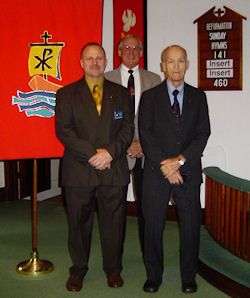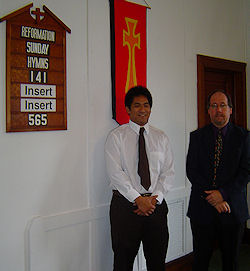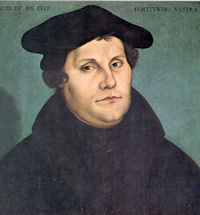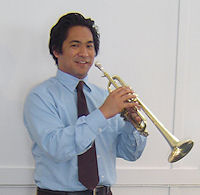Reformation Sunday
Sunday, October 31, 2010

Reformation Sunday at Zion Lutheran Church, October 31, 2010, was special indeed. Morning Events were followed by our end-of-the-month Coffee Fellowship.
GIDEONS. Silverhill's Terry Whiteside from the Robertsdale Camp of the Gideons was with us as a special guest this morning. And there was an opportunity to support the Gideon Bible distribution with a door offering after the service. Five dollars buys one Bible with the Gideons picking up all distribution costs.

Gideons Terry White and Bob Pawson posed briefly with Church Council Chairman Peter Midgarden (l to r) on Reformation Sunday. White presented a Gideon Camp report to the congregation.
FOOD DRIVE. Zion began collecting donations for its annual Thanksgiving Baskets. Collection points were established in the back of the nave for food donations. Donations needed to be in place by November 14. Canned goods (like meats and vegetables), some sweets (like candy and cookies), and some dry goods like rice and instant milk or potatoes "would be useful," it was noted.
SPECIAL MUSIC. Armand Navarro, familiar to Zion as a student from the University of West Florida, accompanied our hymns in honor of our Reformation heritage which we have received as Lutherans. Several hymn melodies composed or arranged by our organist, Dr. Michael Coleman, added to our worship. His works, "The Law of God Is Good and Wise" and "Lord, 'Tis Not that I Did Choose Thee" were printed in our bulletin.

Reformation Sunday Trumpeter Armand Navarro (l) posed with Composer Michael Coleman after the Reformation Service. Coleman's pieces "The Law of God Is Good and Wise" and "Lord, 'Tis Not that I Did Choose Thee" were featured in the Service. Dr. Coleman is Zion's Director of Music.
 
Reformation History
Gutenberg ("Johannes Gensfleisch zur Laden zum Gutenberg," to be exact) introduced the first printing press in 1450. Before this time publications were hand-written. Paper and animal hides were the preferred medium. Books and pamphlets were rare because of the man-hours necessary to produce them and the dearth of materials. That began to change in early modern times.
Shift attention to 67 years later to 1517 - it is 25 years after Columbus discovers America. People don't have newspapers anywhere in the world. In many communities there is a central place that people who can read, gather to read postings. There is this church bulletin board door in Wittenberg, Germany--we would call Wittenberg a "college" town where you have a bunch of thinkers together. It is October 31, 1517. That date is the beginning of the modern church and the idea that you and I can look to the Bible for direction for faith. Prior to this time, people looked to the clerics of the day to interpret the Bible for them, assuming they had access to the printed Word. Today Protestant Christians now look to that Halloween day as the day the church returned to the Bible.
The re-discovery of the Bible occurred because of a number of remarkable events in the life of a young college professor named Dr. Martin Luther. He had been brought up in the only church there was around. That church was called the "catholic" church - note the small "c." That word "catholic" means "universal," and everyone in the Europe of that day belonged to the universal church. There was no other church. Martin had been a good student and had gone to a good school. He had six younger brothers and sisters. His father was a miner; his mom was obviously busy at home. They probably had something like family devotions there. Martin knew about St. Anne, the patron saint of miners. The only "Jesus" Martin knew, was a wrathful judge--a very fearful God in Whom there was no concept of godly love. Luther felt that he could never approach such a God in prayer! Maybe that's how Martin got to know St. Anne, the one that you would talk to so that she could talk to God for you!

Dr. Martin Luther is credited with birthing the Protestant Reformation with the placing of 95 Theses on the Wittenberg Castle Church door in 1517. Both Testaments of Luther's ground-breaking German Bible translation were first published together in 1534. (Luther in 1533, Portrait by Lucas Cranach the Elder, Public Domain Picture).
Martin's mining father was eventually a successful, politically-correct business man. His father had confidence in his son Martin and wanted him to go into law. He felt that Martin would make a good living as a lawyer and would be the one to provide for the Luther family in his parent's old age--we're talking about the times long before the 1930s and social security. And we are talking about before there was anything like social welfare. So, Martin is on his way home during law school days and during a thunderstorm. He is struck by lightning! Do you think he might think God was trying to get his attention? Well, God did get the young man's attention. But, Martin does not pray to God. He prays to St. Anne to help deliver him, makes a vow to go into the clergy, and becomes an Augustinian monk.
Luther's family was not happy with his decision, but Luther takes his vows. The Augustinian abbott, the man in charge, decides this fellow Martin is smart. He puts him into training for the priesthood to become a pastor. And Luther does. He becomes well-educated, is recruited by a college via the abbott, and serves as pastor of the Castle Church in Wittenberg. The "Now-Doctor" Luther is studying, teaching, and preaching. So we are into October 31. It is just another college day, so to speak, and Dr. Luther is doing college things. This gets us to that church door bulletin board in this college town! On October 31, 1517, Luther posts 95 debate sentences for students and towns people to consider.
Remember Gutenberg and the printing press? The folks with printing presses have been looking for things to print, and they discover that here was something printable, because the debate included items related to abuses in the church, things related to buying God's favor. Not only that! These sentences are in German, not Latin like so many other college texts! There was pent up demand for vernacular print, a demand which would bring Luther's German Bible into multiple printings when release 17 years later.
The church of that day taught that you could pay God off for sin and activities that God did not approve of. Luther was a student of the Book of Romans which has a lot to say about what it takes to please God, and the underlying issue in those 95 theses relates to authority through the Christian church versus authority through the authority of the Bible.
There are many other factors that came together about 500 years ago that brought about the development of today's church which is multidenominational. Much of today's Protestant church recognizes "Reformation Sunday" because of the beginning of the Protestant Reformation and the re-discovery of the Bible as an anchor of faith. Those events began on Halloween in 1517! It was Luther's German translation of the Bible that was a factor in raising the number of people who were readers and thinkers in Germany. Reading was stimulated by the Bible's publication by those same publishers who were so anxious get out those 95 Theses short years before the Bible translation.
Think about this: Luther struggled with the same issues we all struggle with. An almost death experience brings focus. There is a decision about life's direction. He struggles with difficulties in deciding how God is directing life. He is troubled with discerning truth. Many of us have similar issues today. Where is God in the turmoil of life and does God care about me? Does Jesus really care? Can the Holy Spirit really be in my life?
Luther found his answers in the Holy Scriptures. He translated the Hebrew, Latin, and Greek Scriptures into the first widely available vernacular German Bible. Germany did not yet exist, but the people of central Europe had their own Bible, because of the events related to 95 debate questions! One key phrase of the Reformation continues to stand the test of time. "God's Word Alone!" On Reformation Sunday, that is our continuing understanding in the historic Lutheran church.
Where does the buck stop when it comes to faith? The church or the Bible? Luther knew the rules of the church of his day, but the rules did not bring faith. They brought fear. The Bible teaches that God the Father sent Jesus the Son because He loved people. It is in John 3:16. Our Heavenly Father sent Jesus to live with us, to know us, and to die for our sins, those things that separate us from Him. In Bible terms, the cross is the Father's commitment to you and me that He cares for us. That was a teaching lost in the Middle Ages but rediscovered by Luther and the Reformers whom we remember on Reformation Sunday.
Reformation Sunday at Zion Lutheran Church will be celebrated at 10 AM worship on October 31, 2010 and will feature special music with Mr. Armand Navarro and Dr. Michael Coleman. 105 year-old Zion Lutheran Church, located a block off State Highway 104 at 15875 4th Avenue at 7th Street in beautiful Silverhill, is just across the street from Silverhill School.
 Dr. Michael Coleman has participated as composer and pianist in numerous new music programs and festivals in the U.S., France, and Russia. He has premiered a number of original piano works and also written works for chamber ensembles, voice, and orchestra. He teaches at Pensacola State College and the University of West Florida and is organist and Music Director at Zion Lutheran Church in Silverhill, Alabama. Zion's Reformation Sunday worship will feature several of his Lutheran hymn harmonizations, arrangements, compositions, and modifications, e.g., "Ein' Feste Burg" (Chorale based on Martin Luther's original melody); Josiah Conder's "Lord, 'Tis Not that I Did Choose Thee" (Melody by Luther); Matthias Loy's "The Law of God Is Good and Wise," and "From Heaven Above to Earth I Come" (Martin Luther), etc.
Dr. Michael Coleman has participated as composer and pianist in numerous new music programs and festivals in the U.S., France, and Russia. He has premiered a number of original piano works and also written works for chamber ensembles, voice, and orchestra. He teaches at Pensacola State College and the University of West Florida and is organist and Music Director at Zion Lutheran Church in Silverhill, Alabama. Zion's Reformation Sunday worship will feature several of his Lutheran hymn harmonizations, arrangements, compositions, and modifications, e.g., "Ein' Feste Burg" (Chorale based on Martin Luther's original melody); Josiah Conder's "Lord, 'Tis Not that I Did Choose Thee" (Melody by Luther); Matthias Loy's "The Law of God Is Good and Wise," and "From Heaven Above to Earth I Come" (Martin Luther), etc.

Mr. Armand Navarro, former Coleman student, and trumpet player, will provide special accompaniment to the Reformation service hymns at Zion Lutheran Church.






|